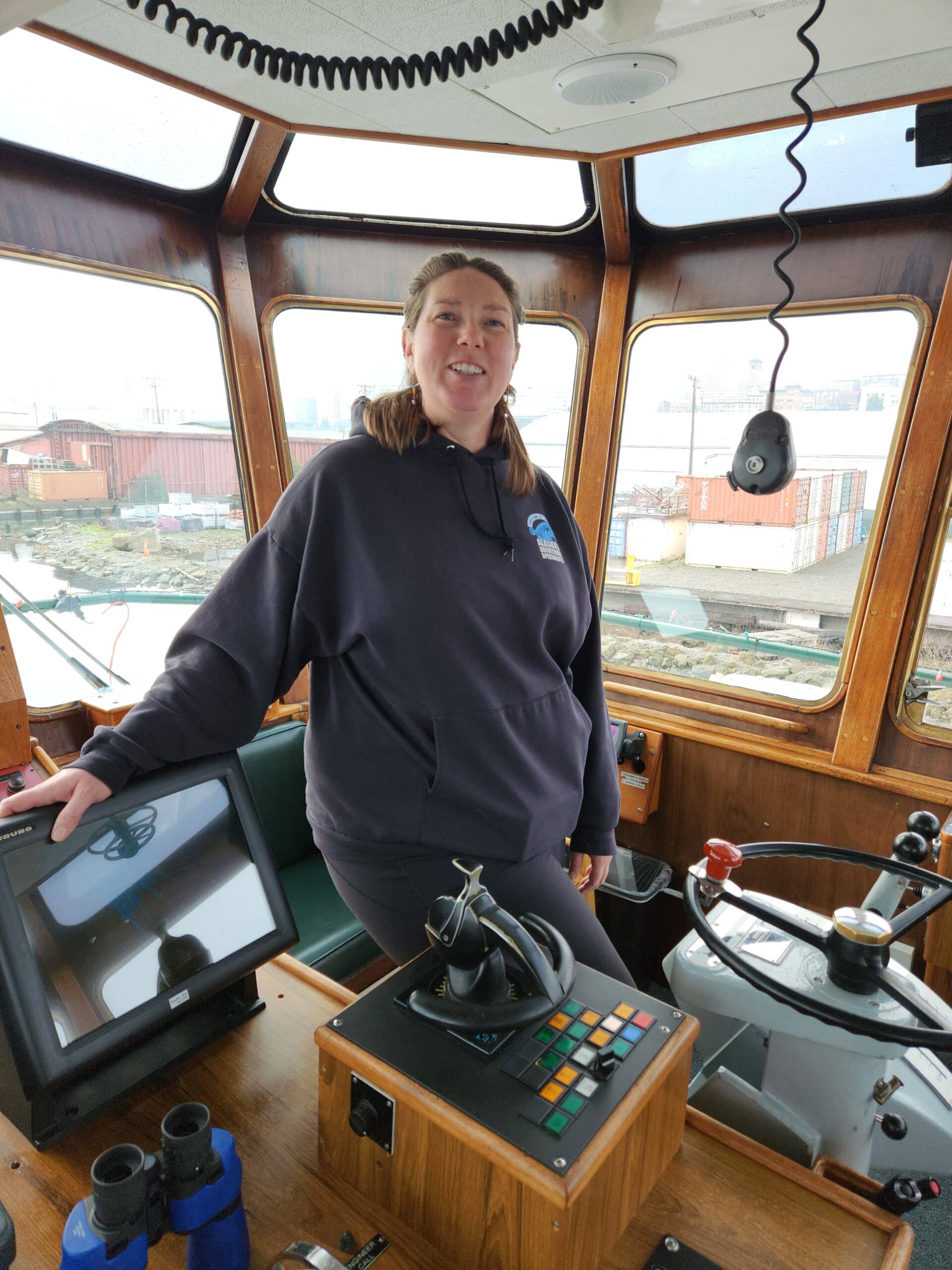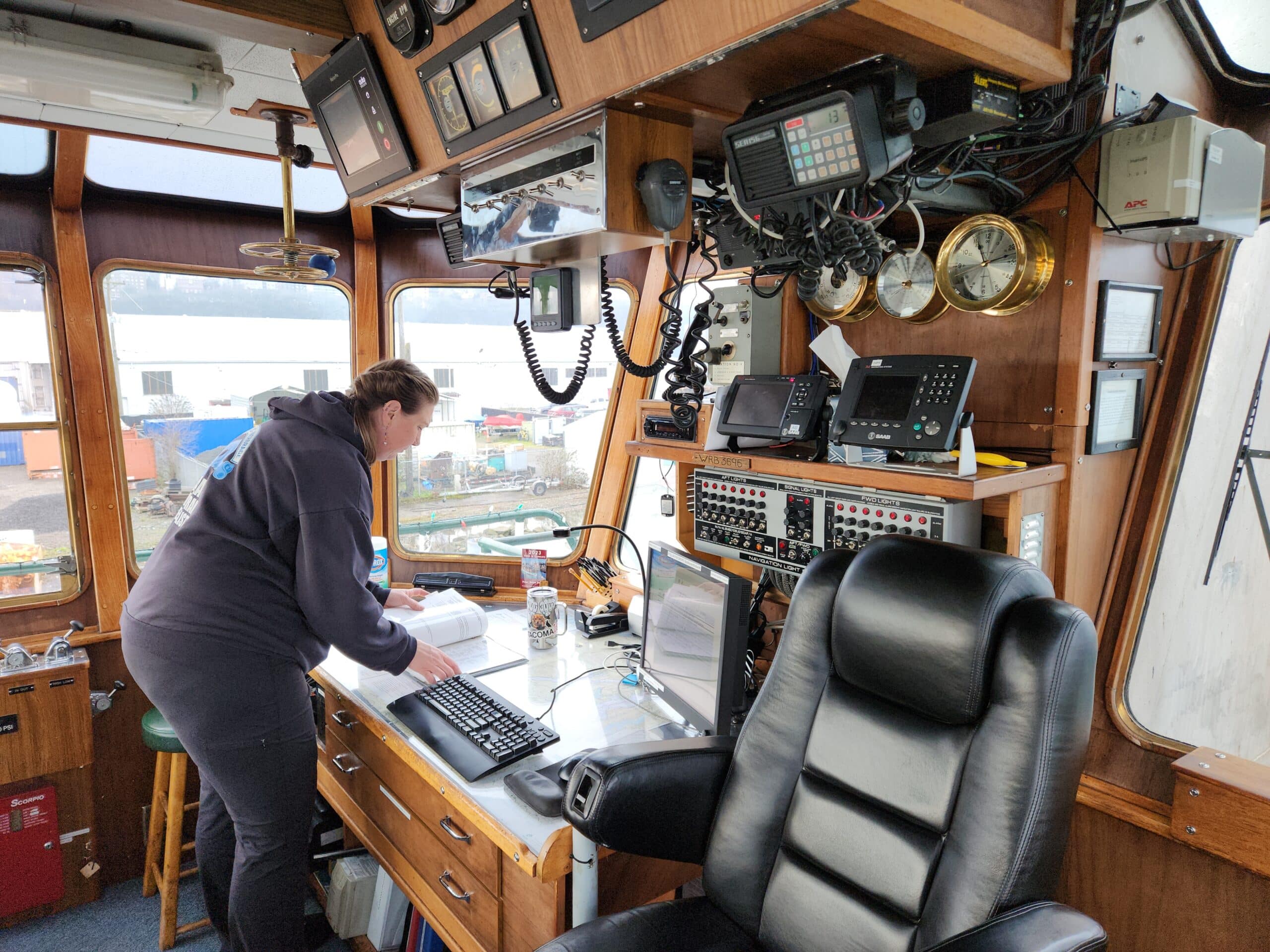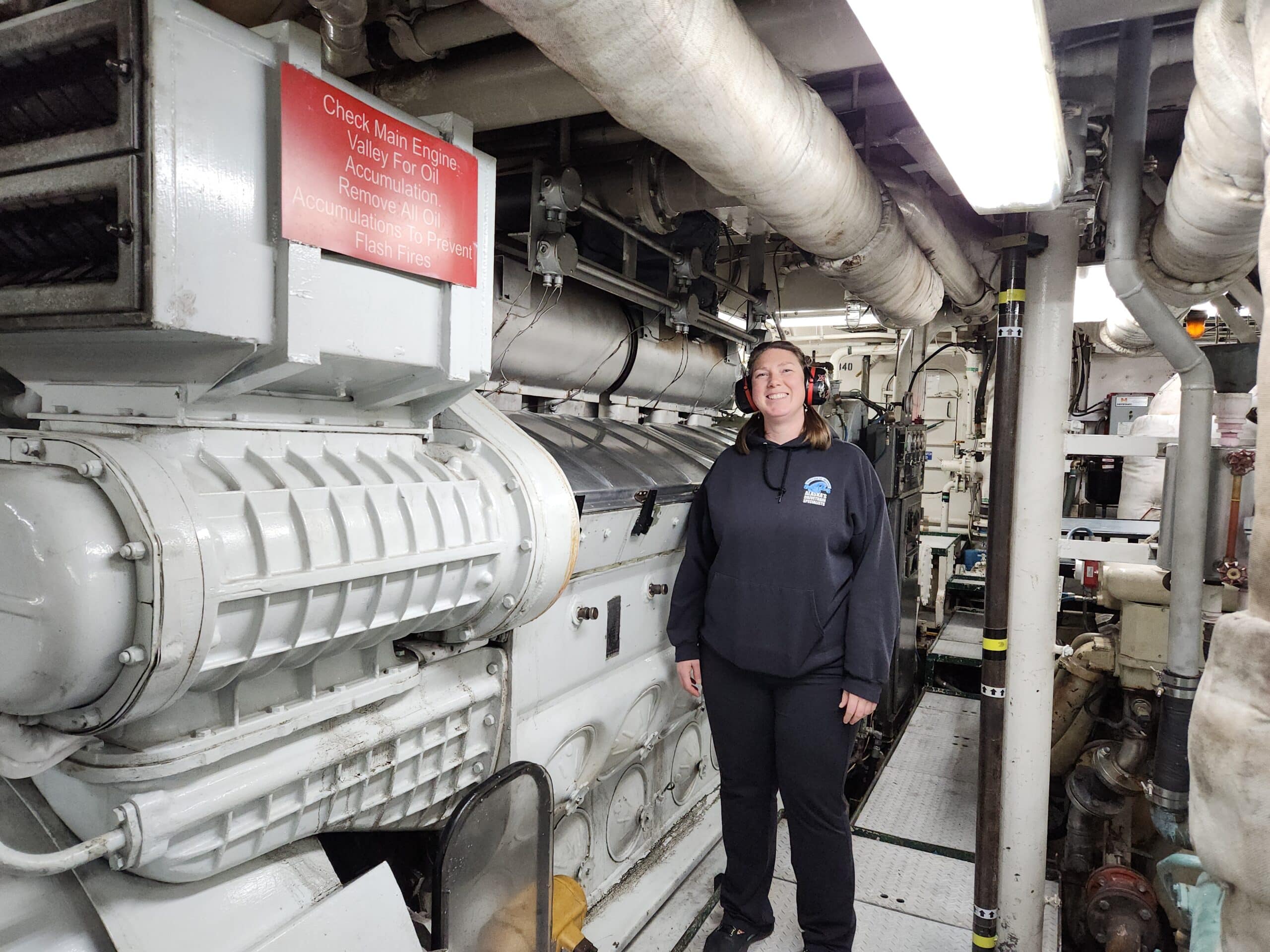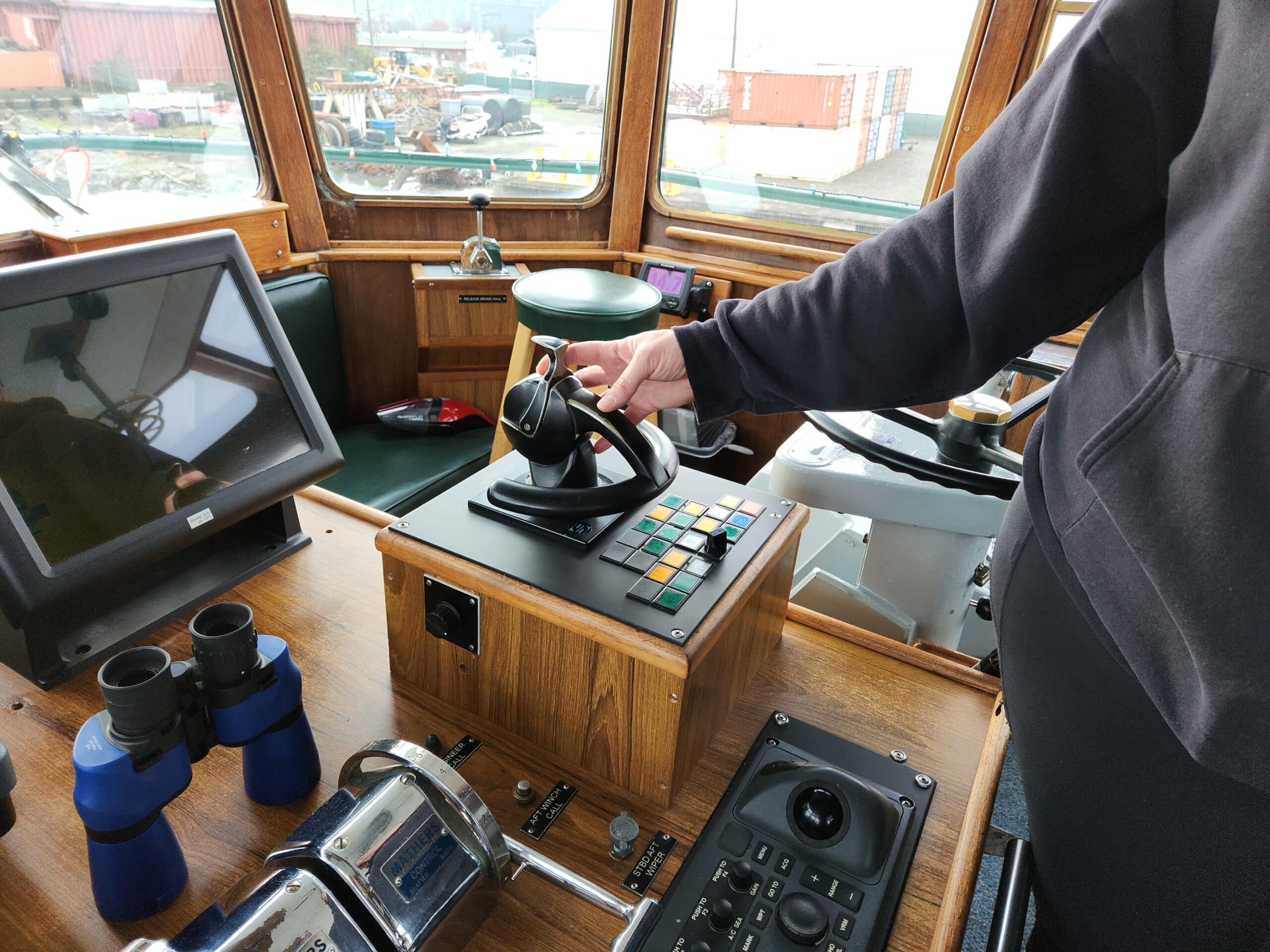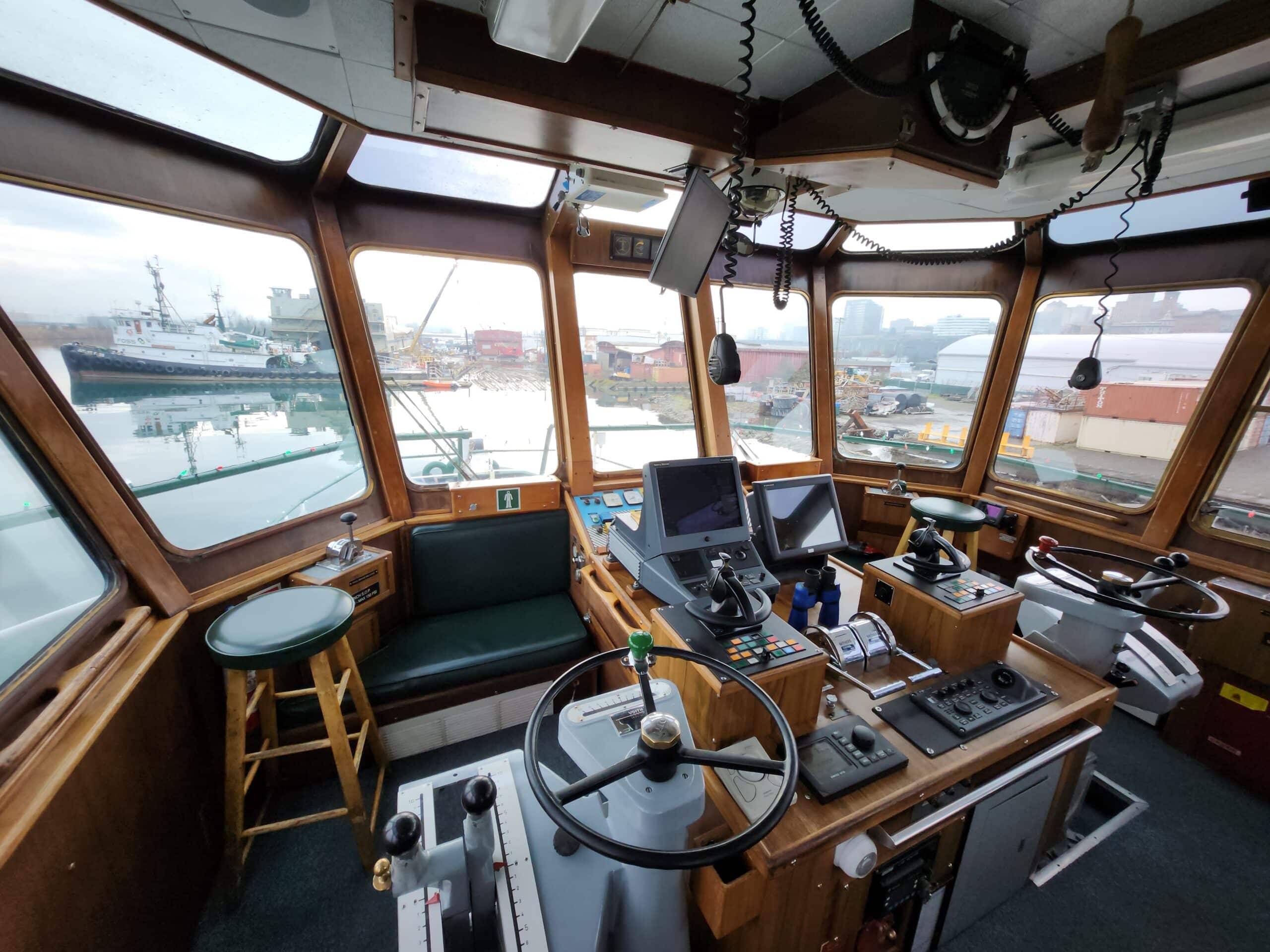Meet Captain Katrina Anderson of the tugboat Wedell Foss. A fourth-generation tugboater, she brings huge ships in and out of ports across the Puget Sound and is one of the only women who captain these important ships.
Katrina’s Day as a Captain
Shipping never stops, so the Wedell Foss doesn’t either. For 15 days at a time, Katrina Anderson lives on board the Wedell Foss, a tugboat that operates between Seattle, Tacoma, and the furthest reaches of the Puget Sound like Bellingham and Olympia. In 12-hour shifts with six-hour watches, Katrina oversees her four-person crew. Together, they guide container ships, oil barges, recycling shippers—and anything else too large to operate within harbors—to approach, dock, and return to open sea.
Her day begins at 6:00 am when she returns to work. Until noon, her “watch” is on, and she’s in charge of the ship. She makes her coffee and heads up to the pilothouse to check in with the prior watch and look over the work for the day.
“Usually there’s a pilot on the ship that’s directing what they want…from the tugboat, [so we] make sure we’re on the same page,” said Katrina. For the next six hours, Katrina will guide bigger vessels into the harbor, either by tying them to her ship with a thick nylon rope and pulling or by pushing with the protected portion of the Wedell Foss.
After her first shift, it’s time for lunch and some rest until 6:00 pm. From “1800” to midnight, she’s back on watch. Between midnight and 6:00 am, she’ll try to sleep through the tug continuing her work. For 15 days at a time, she’s working hard to make sure products reach their destinations and to safely move massive ships into and away from shore.
“I’m pretty good about sleeping [onboard] because I grew up with it. But I know that a lot of other mariners have a hard time.”
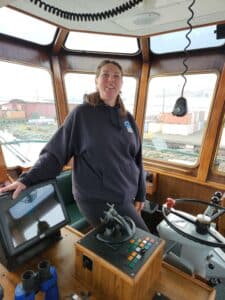
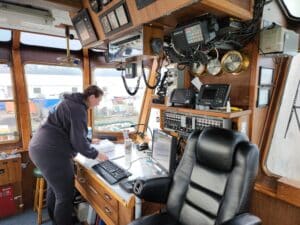
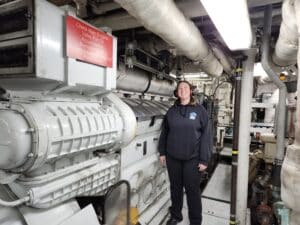
A fourth-generation tugboater, Katrina has worked on board ships like the Wedell Foss for most of her life. “After working for my dad in high school, I just loved the physical labor aspect of it,” she said. “I always knew I wanted to go into tugboats, so I was just preparing myself to run my dad’s company.”
Katrina went to Western Washington University for international business management (with a minor in studio art) and competed on WWU’s rowing team. In the summers, she would return home to Alaska and work aboard tugboats with her family. “At that time, I didn’t really know about the maritime academies that were available,” said Katrina. So instead, she “climbed the hawespipe” and worked her way up rather than going through an officers’ licensing program.
In 2013, Katrina moved from Alaska to Washington for the calmer weather and the opportunity to operate bigger boats. Today, the Wedell Foss spends her downtime at Commencement Bay in Tacoma, where Katrina also lives in the 15 days she is off the ship.
Operating a Tugboat
The Wedell Foss is unique in her maneuverability and design. She is equipped with two main “voith drive” engines with vertical propellers and a third “Z-drive” propeller that can rotate 360 degrees. Katrina says, “It’s extremely maneuverable. Pretty badass in my opinion. One of the funnest boats I’ve ever run.” The third engine, which is an oddity compared to most tugboats, provides a unique boost of power. “A lot of tugboats, you need some forward momentum for steerage. This boat, you don’t need any.”
According to Katrina, there is no upper limit to the types of ships they’ll move. If a ship is too big for the Wedell Foss alone, they just use more tugboats. However, “it just gets awkward if things get too small. We have a little bit too much power.”
The challenges of operating a tugboat like the Wedell Foss don’t end at lifting a heavy rope to gigantic ships either. “Once you get in the wheelhouse, it’s not necessarily physical labor, but just a mental challenge. It is a challenge every day. There is no same day because the weather’s different, the currents are different, the ship is different. There are a lot of factors that you have to problem solve.”
With spaceship-esque control sticks, large wheels, and many levers to control in a narrow cabin, it can be a trial to manage everything safely. “If you have visitors, you call it the wheelhouse dance,” said Katrina.
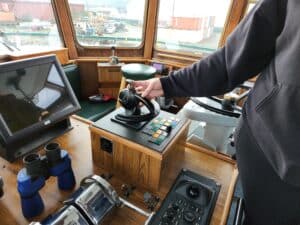
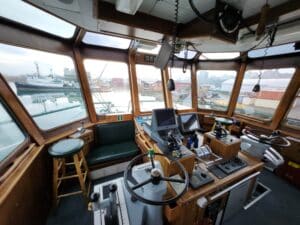
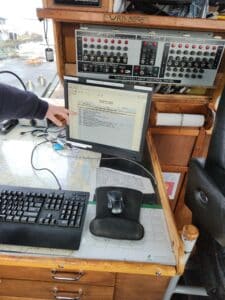
Katrina’s Hope for the Future
Katrina is perfectly aware that, as a woman in maritime, she’s something of an outlier. “There are women, but we’re very far and few between. We only make up two percent of all mariners worldwide,” said Katrina. “I would just love to see more women mariners.”
She isn’t shy about admitting that there are challenges to overcome in her field either. “You have to have thick skin and muscle mass. Especially if you work up the deck like I have. You need to be able to hold your own and be somewhat of an athlete…. It’s probably a lot along the lines of construction or any of the trades. Women are definitely entering those fields, and the men are coming around and being more accepting, …[but] it’s still rough and tough.”
However, Katrina believes that “the culture has changed a little bit. When I first started here, there was definitely no leaving the boat at all for anything, which was really isolating,” she said. “Especially when you see town. It’s different if you’re out to sea. There’s no opportunity to go to town.” Katrina recently moved to Tacoma to be closer to the boat, where it is regularly docked. “Every once in a while, I can sneak away, but we have to stay within 15 minutes of the boat because the schedule can change at any moment.”
“There are just so many things that I love about this job,” said Katrina. “I do really want people to enter it. It is really challenging mentally, but it’s also really rewarding. There are very few of us, but it’s a really important job. And, you know, we keep literally everybody running.”
She says it’s still very possible to work your way up in maritime industries. With some easily acquired certifications, “you can start in the business in a matter of months,” said Katrina. “I’m really happy that other ladies are coming in.”



